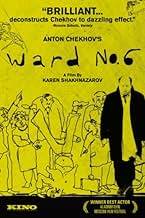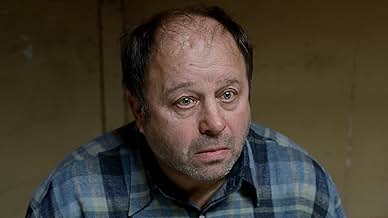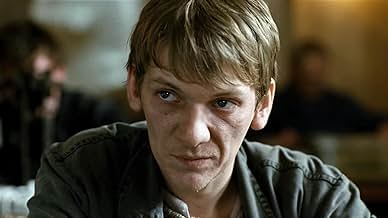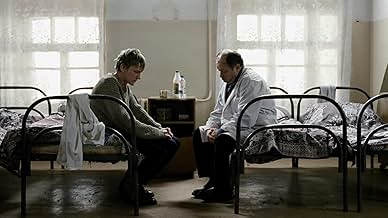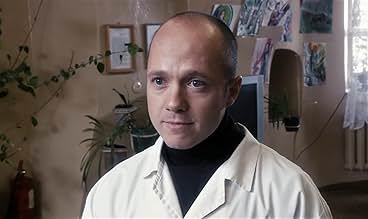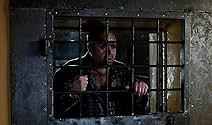Füge eine Handlung in deiner Sprache hinzuSimultaneously nihilistic and heartening, Ward No. 6 is based on a story by Chekov, in which a psychiatric doctor becomes a patient in his own asylum. Updated to contemporary Russia, the fil... Alles lesenSimultaneously nihilistic and heartening, Ward No. 6 is based on a story by Chekov, in which a psychiatric doctor becomes a patient in his own asylum. Updated to contemporary Russia, the film is a cocktail of anxieties and riddles, showcasing how easy it is to become what we fear... Alles lesenSimultaneously nihilistic and heartening, Ward No. 6 is based on a story by Chekov, in which a psychiatric doctor becomes a patient in his own asylum. Updated to contemporary Russia, the film is a cocktail of anxieties and riddles, showcasing how easy it is to become what we fear most.
- Regie
- Drehbuch
- Hauptbesetzung
- Auszeichnungen
- 4 Gewinne & 7 Nominierungen insgesamt
Empfohlene Bewertungen
What I got was a series of clinical interviews that sort of reminded me of the beginning of District 9. The quality of the lighting and shot set up was very flat. Patients are talking to the camera about why they're institutionalized, and it's incredibly sad. Most were dropped off at an orphanage by their own parents and once they aged out, they were moved to the psychiatric facility. They've never had a chance to have a life, because their parents couldn't handle their responsibility. That is horrible! But, I actually would not have minded a more intense study of that situation. Instead, a doctor begins to lead a tour and eventually reveals that his predecessor is now, in fact, a patient. Dr. Ragin had a sort of comfortable life going. But rather than any kind of therapy sessions, he got into philosophical discourses with friends and one patient, in particular, and seemed to be spiraling into a depression about existential issues. The plot is slow. The conversations are like Crime and Punishment. Ward No. 6 is based on a short story by Anton Chekhov, so I shouldn't have been surprised, but honestly, I had a hard time staying focused. It made me sleepy. Ward No. 6 gets a 6 out of 10.
There was nothing intellectually or artistically stimulating about watching these poor people... and there was nothing intelligent about the story superimposed on them at least in the confusing way this film portrays it.
Apparently in the original short story (By Chekhov) a Doctor finds the most interesting person in the backwater where the psychiatric instution is located is one of the paranoid schizophrenics. That is believable. In the original story this Doctor is tricked into being admitted into the hospital...also believable but none of this comes out in this movie! In the movie this Doctors best friend runs a store or so it seems. And then this Doctor is admitted and has a stroke. None of it is explained...
I also felt sorry for the patients being filmed. The ending with kids laughing was supposed to be deep in some way and like the rest of this movie is nothing more than meaningless garbage thinking it is deep or artful.
Also cheaply filmed and very erratic camera work.
DO NOT RECOMMEND
The movie might seem slow to some viewers. It's like that for a reason. It gives the patient time to explain his philosophy to the doctor. The movie poses the question of which people can be considered insane in a rotten-to-the-core society (much like how "A Clockwork Orange" does). Most of the movie takes place indoors, emphasizing the feeling of imprisonment.
I don't know that I would call it a masterpiece, but it's worth seeing. It not only addresses the issue of insanity, but also shows the horrible conditions in the mental institutions. I'd say that it was the right choice for Russia's submission to the Academy Awards that year.
This simple story raises complex questions in our mind. What is insanity? Who defines it? The director narrates Chekov's story in a semi documentary fashion. It doesn't work too well and leaves us rather indifferent to Doctor Ragin's predicament. But I think this form of narration serves the purpose of setting Chekov's story in the contemporary context. The haunting New Year's eve dance sequence is comical yet so chilling! How easily does the State machinery makes its citizens fall in line. What if the State is a lunatic asylum? Thought provoking question for citizens who live under dictatorial regimes!
The film ends with a very intriguing sequence in which a woman who lived next door to Doctor Ragin is being interviewed. Her younger child cannot suppress her laughter and the camera lingers long over her face and that of her sister. Is it laughter of innocence or mischief? The viewer has to make his own judgement.
Wusstest du schon
- WissenswertesRussia's official submission to the Best Foreign Language Film Category of the 82th Annual Academy Awards (2010).
- Zitate
[first lines]
Vladimir Kozlov: Vladimir Vladimirovich Kozlov, born in 1979, on August 15.
Interviewer: For how many years have you lived here?
Vladimir Kozlov: This is... the fifth year.
Interviewer: Where did you live before you came to this nursing home?
- VerbindungenFeatured in 8½ Kinoklub Dyskusiynyi (2016)
- SoundtracksAkapulko
Music by Igor Krutoy
Lyrics by Viktor Pelenyagre
Performed by Laima Vaikule
Played at the New Year party
Top-Auswahl
Details
- Erscheinungsdatum
- Herkunftsland
- Offizielle Standorte
- Sprache
- Auch bekannt als
- Ward No. 6
- Drehorte
- Dmitrovsky rayon, Moskovskaya oblast, Russland(mental health nursing home)
- Produktionsfirma
- Weitere beteiligte Unternehmen bei IMDbPro anzeigen
Box Office
- Weltweiter Bruttoertrag
- 115.095 $
- Laufzeit
- 1 Std. 23 Min.(83 min)
- Farbe

